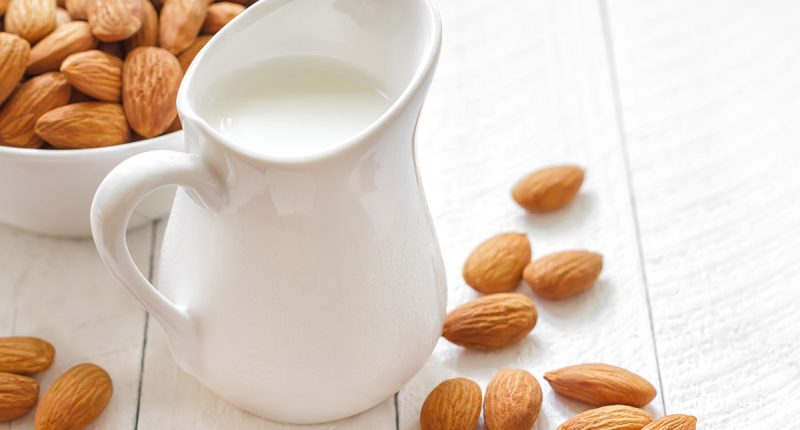The 8 Best Almond Milks to Buy, According To Dietitians – The product recommendations in this post are recommendations by the writer and/or expert(s) interviewed and do not contain affiliate links. Meaning: If you use these links to buy something, we will not earn a commission.
From almond milk to oat milk, there’s no denying that alternatives to traditional dairy milk are here to stay. In fact, in a recent poll conducted by the dairy farmer cooperative Arla, 49% of Gen Z respondents admitted they “feel ashamed” to order a beverage containing dairy milk, particularly in front of others. While the notion of milk-shaming someone is obviously a bit extreme, it’s clear that nondairy milk products are more than a fleeting trend.
For those who grew up on dairy milk or consider themselves to be “cow milk purists,” the notion of almond milk (or even the prospect of milking a nut) may seem strange. But we can assure you that cultivating a milk-adjacent product using almonds as the primary ingredient is not as, well, nuts as you might assume. In fact, many varieties of almond milk typically include a few simple ingredients that combine to form a delicious, creamy, lactose-free beverage that’s excellent in coffee, smoothies, cereals, and even as a substitute for baking!
Read on to learn more about almond milk, courtesy of some of our expert RDs—including which almond milk brands you should add to your cart and which ones you should steer clear of on your next grocery trip. And next, check out 7 Tricks To Help You Poop First Thing Every Morning
What is almond milk, & what are its benefits?
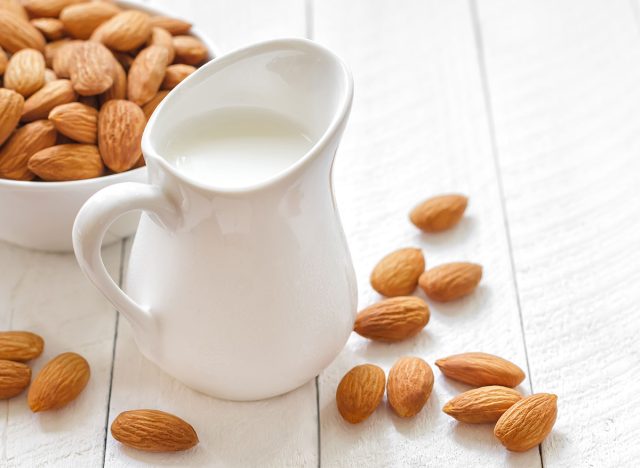
Almond milk is a plant-based beverage comprised mainly of crushed almonds and water. However, many store-bought brands of almond milk include other ingredients designed to enhance the flavor profile and/or up the nutritional content to rival that of other milk types. A vegan-friendly lactose-free alternative to dairy milk, this off-white creamy drink mimics the appearance and texture of traditional cow’s milk, but with a more nutty taste.
“Drinking almond milk can allow people who cannot tolerate dairy milk the ability to enjoy foods that traditionally pair well with milk, like cereal,” says Lauren Manaker, MS, RDN, registered dietitian and author of The First Time Mom’s Pregnancy Cookbook and Fueling Male Fertility.
“The nutritional benefits of drinking almond milk would be to get some calcium, and vitamins A, D, and E (if fortified),” adds Toby Amidor, MS, RD, CDN, FAND, the award-winning nutrition expert and Wall Street Journal bestselling cookbook author of Up Your Veggies: Flexitarian Recipes for the Whole Family.
How does almond milk compare to dairy milk & other milk alternatives?
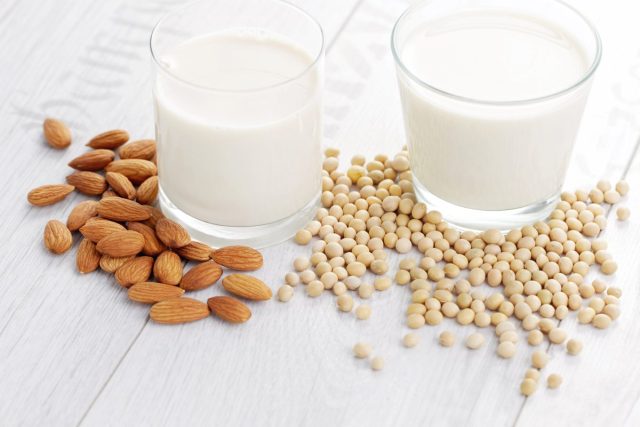
“Most almond milks are not nutritionally equivalent to dairy milk,” says Manaker. “They are typically lower in protein, they may have added sugars, and the micronutrients are not all the same.”
“The 2020–2025 Dietary Guidelines for Americans (DGA) recommends three servings of dairy per day,” explains Amidor. “The guidelines specify that due to the nutrition of cow’s milk (yogurt, cheese) and soy (and soy yogurt), these are the only two ‘milk beverages’ that are part of this group.”
“Per page 33 of the DGAs, ‘Other products sold as milks but made from plants (e.g., almond, rice, coconut, oat, and hemp ‘milks’) may contain calcium and be consumed as a source of calcium, but they are not included as part of the dairy group because their overall nutritional content is not similar to dairy milk and fortified soy beverages,'” Amidor continues. “Therefore, consuming these beverages does not contribute to meeting the dairy group recommendation.”
“Because of this, the USDA does not consider almond or oat milk to be a comparable swap to dairy milk,” Manaker explains.
“[On the other hand,] cow’s milk provides 13 vitamins and minerals, including calcium, vitamin D, protein, and several B vitamins, zinc, selenium, vitamins A and D, and iodine,” adds Amidor. “One cup of nonfat milk provides 90 calories and 8 grams of protein.”
“Oat milk does not provide the same nutrients as dairy milk either,” says Manaker.
“Oat milk has a sweeter flavor but still lacks the full nutrition of cow’s milk or soy milk,” Amidor elaborates. “It has recently become more popular due to its sweeter flavor and creamy texture. Again, the DGAs recommend that you can enjoy oat milk as part of a healthy diet for calcium, but you would still need the three servings of milk and dairy in order to get your complete nutrients to keep you healthy.”
“The only dairy-free alternative that they recognize to be an acceptable substitute to dairy milk is soy,” says Manaker.
How do you choose the best almond milk?

“If you would like to enjoy almond milk as part of your healthy eating plan, opt for an unsweetened variety,” says Amidor. “If you are using a small amount of flavored almond milk to sweeten coffee or as more of an indulgence, then compare the nutrition facts panel for added sugar.”
“People who are choosing to drink almond milk should ensure that the added sugar content isn’t too high, especially if their overall diet is rich in added sugars,” says Manaker. “They should also ensure that almond milk provides nutrients that they may not be getting elsewhere, especially if they do not consume dairy foods.”
The 8 best almond milk brands you can buy
Check out these dietitian-approved almond milk brands, and consider picking these up on your next shopping trip.
1. Blue Diamond Almond Breeze Original Almondmilk
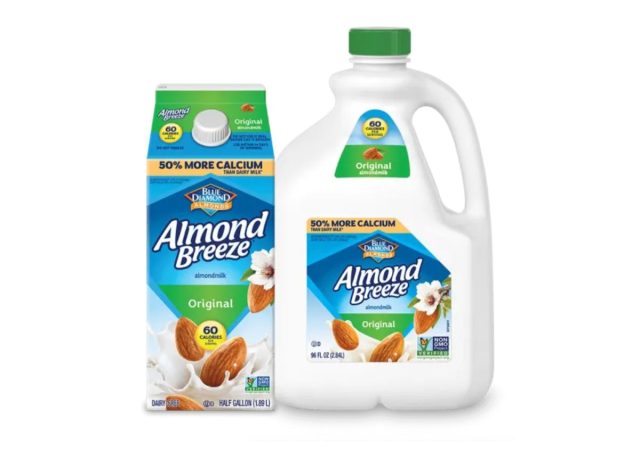
Per serving: 60 calories, 2.5 g fat ( 0 g saturated fat), 150 mg sodium, 8 g carbs ( <1 g fiber, 7 g sugar), 1 g protein
“One cup of unsweetened Almond Breeze almond milk is lower in calories with 40 and 1 gram of protein,” says Amidor. “It is a good option if you want some added calcium and love the flavor. However, it is still recommended to get 3 servings of milk and dairy foods (or soy) in addition.”
“In my cookbooks, I have several smoothie recipes that call for unsweetened almond milk. The almond milk is used to complement the flavors (typically, if I use almond butter, I will add it). I try to use the sweetness of fruit which has natural sugar as the sweetener. This is the almond milk I choose when I test my recipes.”
2. Silk Protein
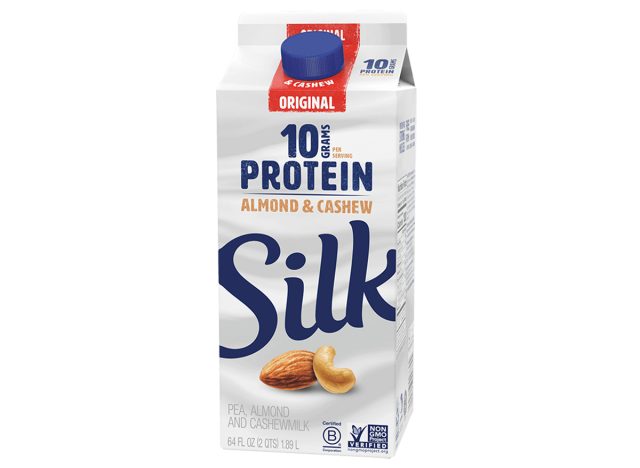
Per serving: 130 calories, 0.5 g fat ( 0 g saturated fat), 230 mg sodium, 3 g carbs ( <1 g fiber, 2 g sugar), 10 g protein
Though this almond milk is a blend of three different plant-based proteins—including almonds—it still receives the RD-stamp of approval, as this trifecta of proteins makes this a more nutrient-dense product.
“My favorite almond milk is the Silk Protein, which is actually a blend of almond, cashew, and pea protein,” explains Kacie Barnes, MCN, RDN, founder of Mama Knows Nutrition. “Most almond milk is low in calories and protein—not a good substitute for what you’d get in cow’s milk. But this one has an impressive 10 grams of protein per cup!”
3. Elmhurst Milked Almonds
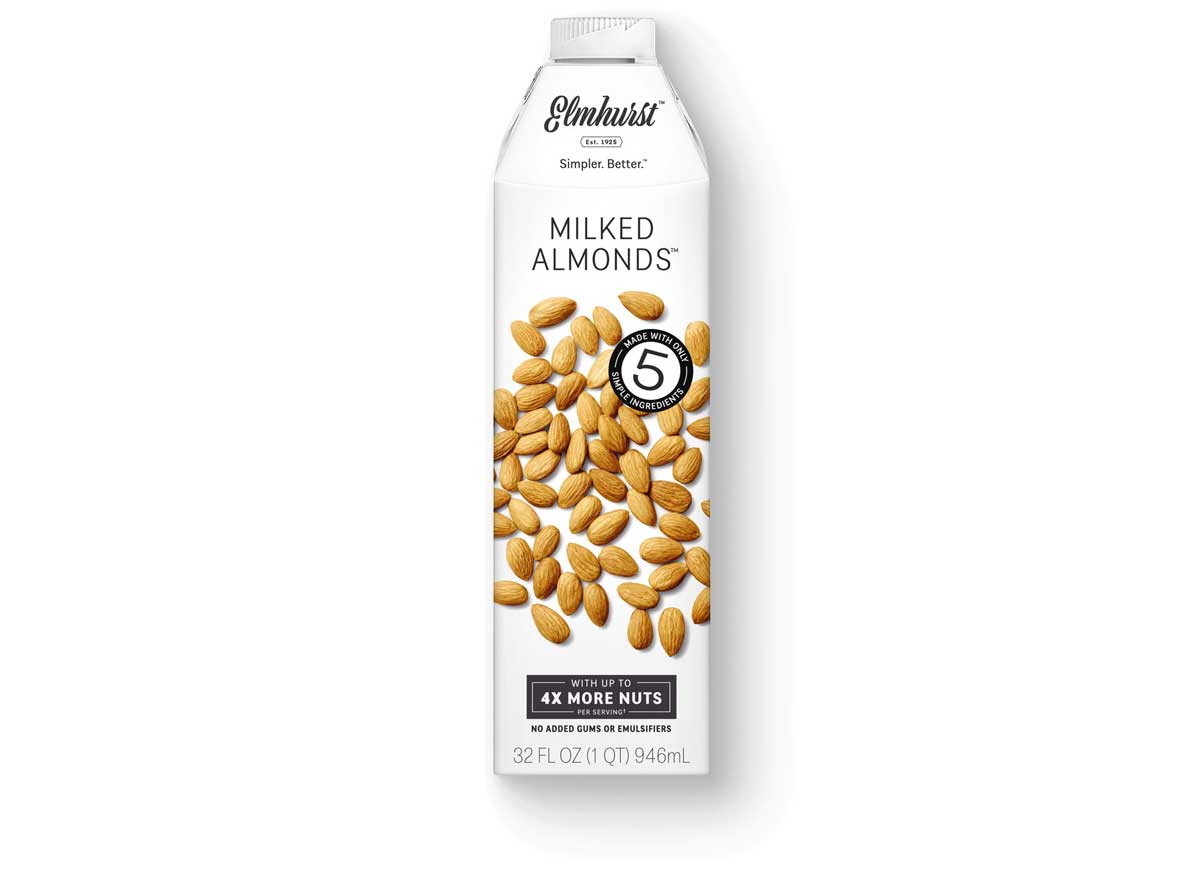
Per serving: 130 calories, 11 g fat (1 g saturated fat), 5 mg sodium, 3 g carbs (0 g fiber, 1 g sugar), 5 g protein
“I like the Elmhurst almond milk,” says Hailey Crean, MS, RD, CDCES, registered dietitian and certified diabetes care and education specialist of Hailey Crean Nutrition, LLC. “It has a higher concentration of almonds and doesn’t have any added sugar, gums, or emulsifiers.”
Elizabeth Ann Shaw, MS, RDN, CLT, registered dietitian nutritionist and author of the Fertility Foods Cookbook, agrees. “I love this brand, and their packaging is simply stunning!” she says. “It also has one of the highest amounts of protein (5 grams per cup) on the market for an almond milk. Their milked almond product also comes in a no added sugar variety.”
4. Califia Farms Organic Unsweetened Almond Milk
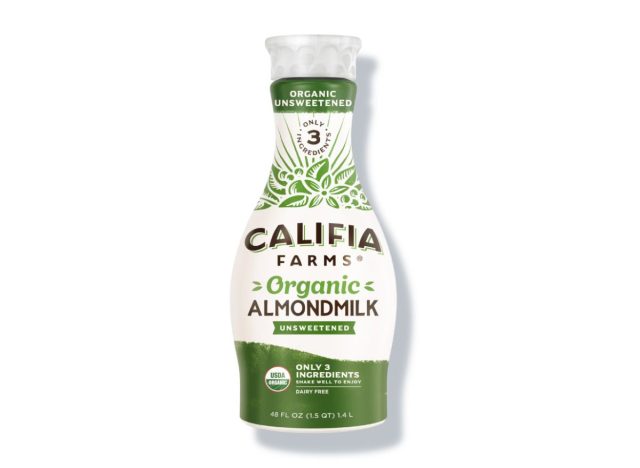
Per serving: 60 calories, 5 g fat ( 0 g saturated fat), 140 mg sodium, 1 g carbs ( <1 g fiber, 0 g sugar), 3 g protein
“I personally love the Califia Farms Organic [Unsweetened] Almondmilk, which is made from water, almonds, and sea salt,” says Roxana Ehsani, MS, RD, CSSD, LDN, a board-certified sports dietitian. “Just three ingredients combine to create a dairy-free goodness in its purest form. It’s great for cereal, smoothies, cooking, and baking. It’s also certified organic and contains no oils or gums and zero additives. I’d consider it to be the best almond milk!”
Julie Upton, MS, RD, CSSD, and member of our Medical Expert Board, is also a fan of this particular almond milk product, telling us, “This is a brand I buy. Nutritionally, I like that it has no saturated fat and provides 3 grams of protein, which is typical for almond milk,” says Upton.
5. Silk Unsweetened Almond Milk
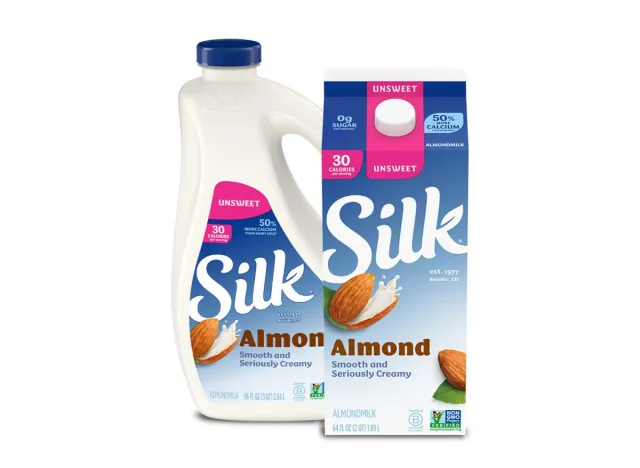
Per serving: 30 calories, 3 g fat ( 0 g saturated fat), 140 mg sodium, <1 g carbs ( 0 g fiber, 0 g sugar), 1 g protein
“This almond milk is commonly found in my local supermarkets, and it’s another brand I choose in my recipe testing,” says Amidor. “This brand provides 30 calories per cup—so it’s a nice low-calorie addition to coffee and smoothies.”
6. MALK Pure Unsweetened Almond Malk
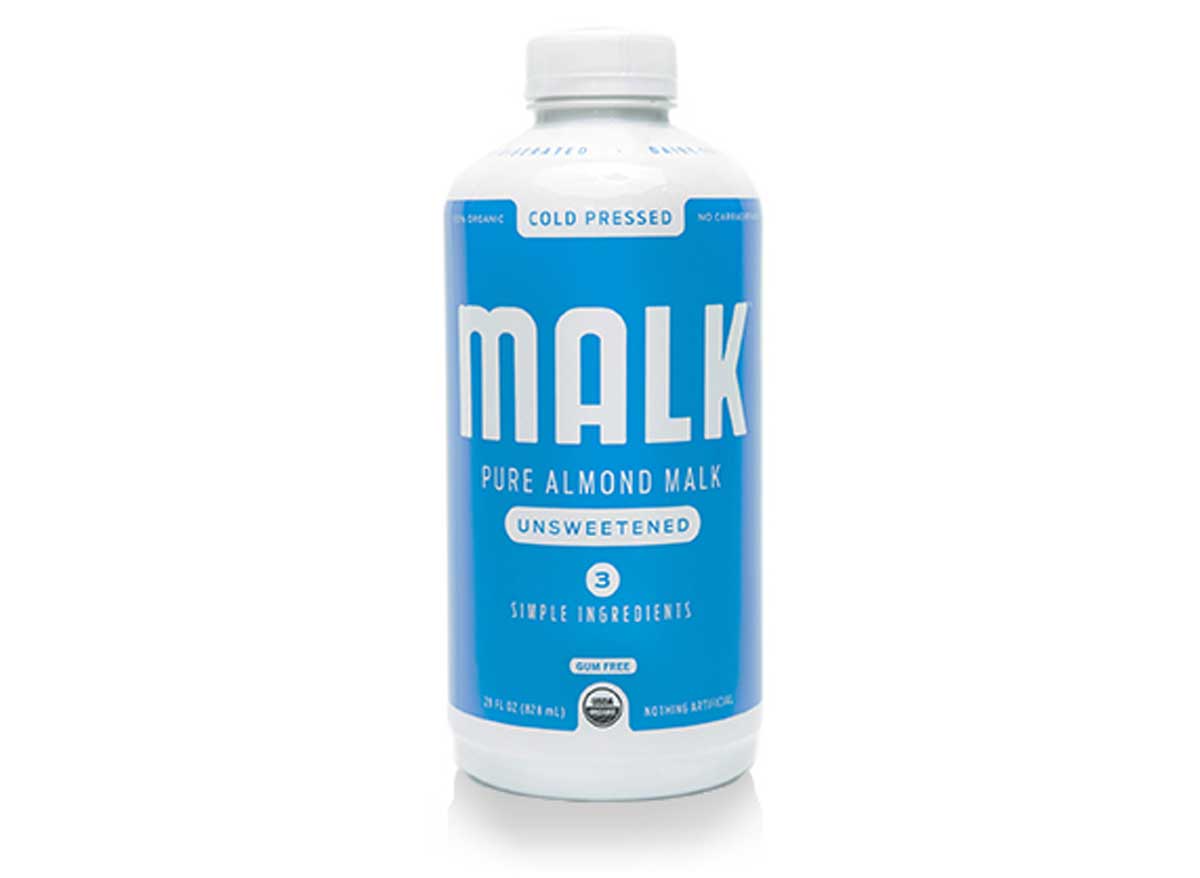
Per serving: 100 calories, 9 g fat (0.84 g saturated fat), 75 mg sodium, 2 g carbs (1 g fiber, <1 g sugar), 4 g protein
“The ingredients are easy to read and understand (filtered water, organic sprouted almonds, Himalayan salt), meaning you won’t be filling up on potentially questionable fillers that may alter your GI system,” says Shaw. “It is a little pricer than the mainstream brands, but depending on how much you drink almond milk, it may be worth the extra penny. Plus, it also has 5 grams of protein and no added sugar.”
7. Orgain Unsweetened Almondmilk
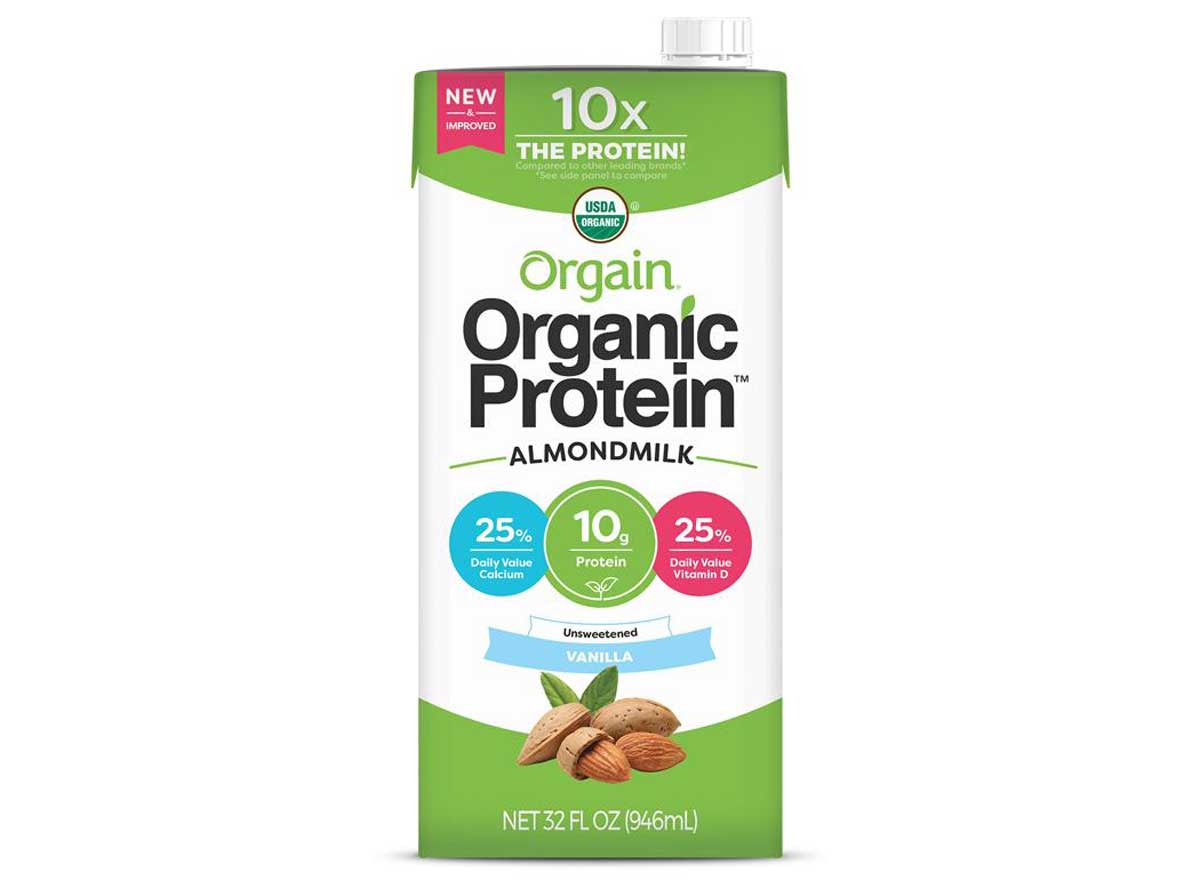
Per serving: 100 calories, 3 g fat (0 g saturated fat), 220 mg sodium, 4 g carbs (2 g fiber, 0 g sugar), 10 g protein
“Orgain offers an option with more protein than the classics,” says Kelly Jones MS, RD, CSSD, LDN, registered dietitian and owner of Kelly Jones Nutrition. “The protein comes from peas, a popular source lately due to its smooth texture and quality source.”
8. Califia Farms Almondmilk Barista Blend
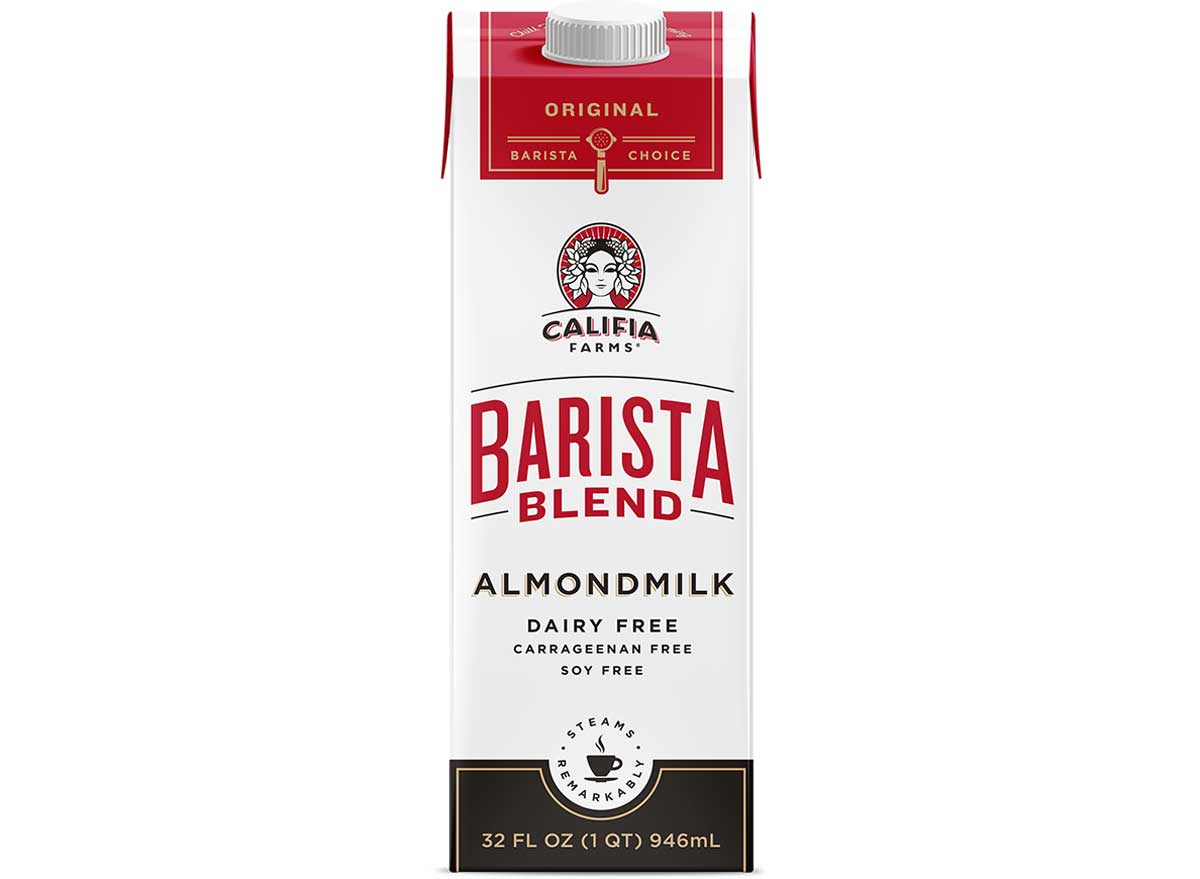
Per serving: 70 calories, 4.5 g fat (0 g saturated fat), 180 mg sodium, 7 g carbs (1 g fiber, 5 g sugar), 2 g protein
“This is hands down the best option for your lattes!” says Jones. “It offers the creaminess you crave, frothing well and allowing for latte art galore, with the same delicious taste as the original version. It also has an unsweetened variety, which is a rare find for lattes in cafes.”
The worst types of almond milk you can buy
The unhealthiest almond milks contain high levels of sugar and questionable additives, in addition to lacking the vitamins and minerals other brands are enriched with. Here are a few to avoid:
1. New Barn Organics Unsweetened Almondmilk
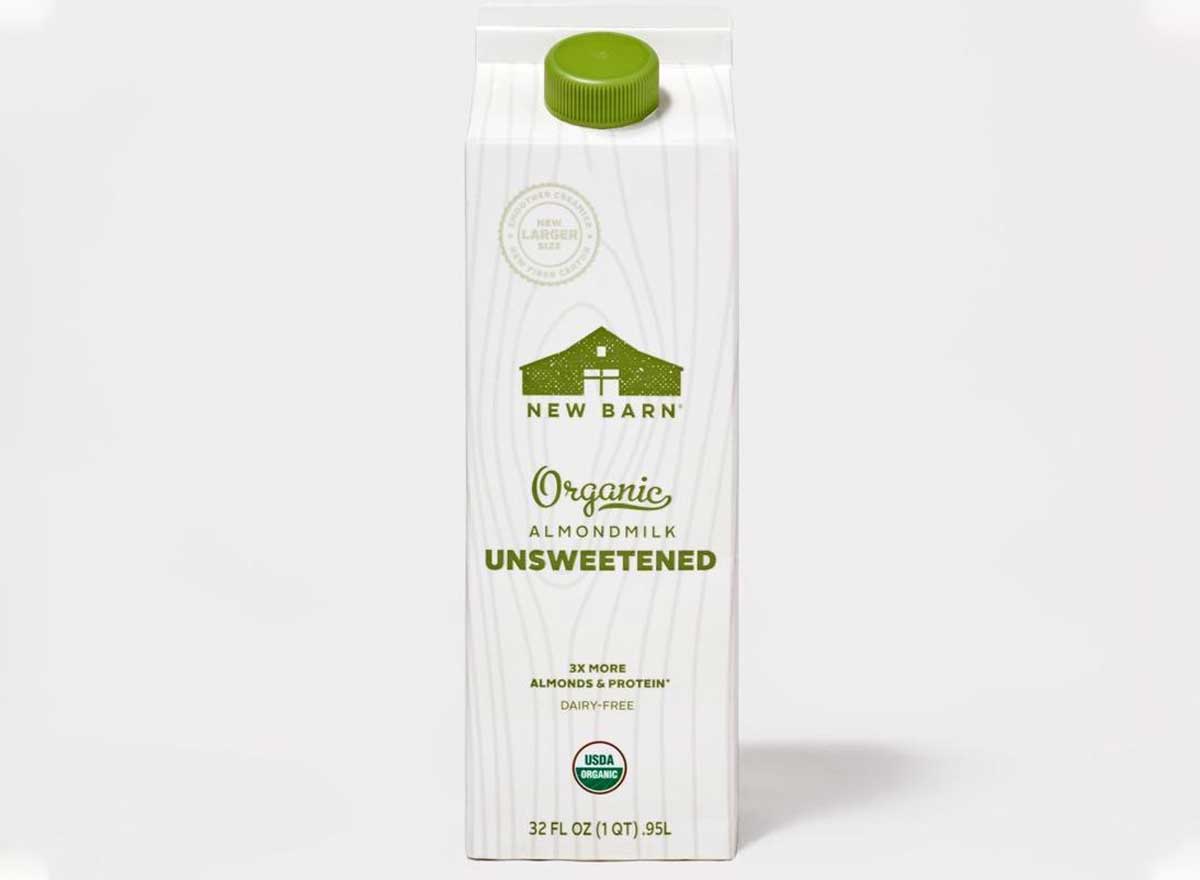
Per serving: 90 calories, 8 g fat (1 g saturated fat), 55 mg sodium, 1 g carbs (0 g fiber, 0 g sugar), 3 g protein
“Unlike other brands, [New Barn Organics] doesn’t add any vitamins or minerals. This means, unlike a cup of another brand that gives you a good dose of calcium, vitamin D, and vitamin E, this almond milk barely gives you any,” says Sammi Haber Brondo, MS, RD, CDN, registered dietitian nutritionist and author of The Essential Vegetable Cookbook.
2. Silk Dark Chocolate Almondmilk
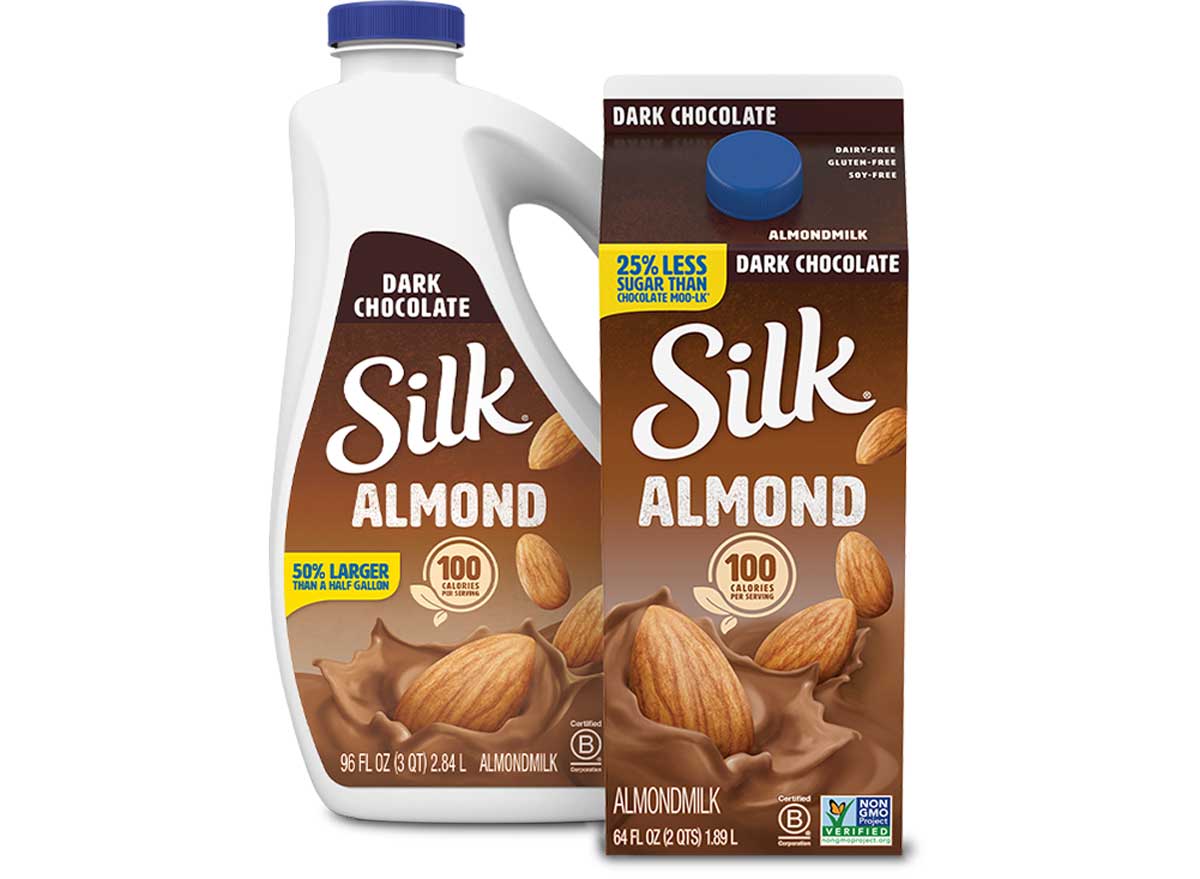
Per serving: 100 calories, 2 g fat (0 g saturated fat), 220 mg sodium, 19 g carbs (1 g fiber, 17 g sugar), 1 g protein
“Don’t let the health benefits of dark chocolate fool you here! This almond milk still comes in with 17 grams of added sugars in one serving,” says Shaw. “Instead, enjoy a piece of 70% dark chocolate and relish in the antioxidant benefits of the flavonoids in that treat rather than a sugar overload in this beverage.”
3. Any variety with over 10 grams of sugar

“One big difference with dairy and almond milk is that dairy contains the natural sugar lactose, which doesn’t impact blood sugar responses as much as added sugars,” says Jones. “It also has protein to blunt the response. Some sweetened almond milk can have as much as 20 grams per serving, so save those options for rare occasions.”
A previous version of this story was originally published in December 2019. It has been updated to include additional copy and proofreading revisions, further research, and updated contextual links.
